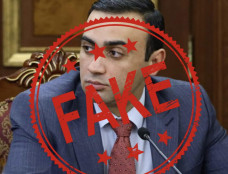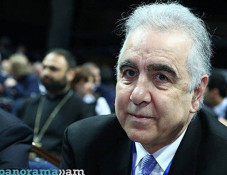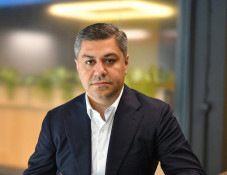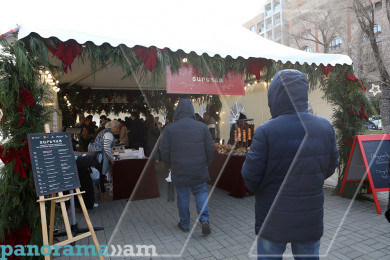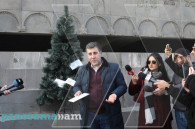26 years after genocide in Baku: “Someone informed pogromers that young Armenian woman hid in that house, and they came after me…”
“Azerbaijan’s savagery shocks. Only thinking about it,” Russian poet David Samoylov wrote in his dairy on 18 January 1990. Twenty-six years have passed since the day when the last act of genocide against the Armenians in Azerbaijan was committed in Baku – large-scale and mass pogroms of the Armenian population were conducted putting a full stop to the glorious history of the Baku Armenians. All these years, Azerbaijan goes on unceasingly distorting the truth about the ‘Black January’ of 1990 on the highest level, attempting to erase the traces of the genocidal attempt against the native residents of Baku, Armenians, from the history.
However, numerous facts, eyewitness-accounts, photos and videos exist to confirm the indisputable truth: a genocide was committed against the Armenian population in the Azerbaijani capital from 13 to 19 January resulting in hundreds of victims and disabled people, deportation of dozens of thousands of Baku Armenians. The most important aspect is that there are hundreds of thousands of eyewitnesses alive, who still feel ‘baku’ as a bleeding wound, an unforgettable and incurable pain.
Panorama.am has already reported that a collection book Baku Tragedy: Eyewitness Accounts is to be published in the frameworks of the project Ordinary Genocide. It will include the interviews of about 50 refugees currently living in the US who speak about their memories. The film ‘A Century-Long Genocide. Black January of Baku,’ whose presentation took place a year ago, was made based on those accounts.
Today, Panorama.am starts publishing chapters from the future book, provided to the website by Marina Grigoryan, the manager of the project An Ordinary Genocide.
Yelena Vladimirovna HAJIBEKOVA (Hajibekyan). Lived in 5 Sverdlovskaya Street, Baku.
I was born in Baku, as everyone in my family. My father was a very respectable person; he taught maths and English. Mother taught English. I worked at Bakelektrobitpribor union in 1988.
How did we learn about Sumgait? Amin Amirjanov, an acquaintance of ours, worked at militia. Once, in late February, early in the morning, he ran up in shock to his cousin, our neighbour Robert, and told him not to go to work in Sumgait as horrible events were going on there. His sister worked at Baku ambulance. She later told us many things, what terrible cases they had had during the calls, how people had been jumping from the roofs hand in hand and being taken to hospitals with extremity fractures, what tragedies had taken place there. My cousin’s aunt, Valentina, was the head of gynaecology department at Sumgait hospital. She had to go down to the basement where the Armenians were hiding, as there was no one else to help deliver. She also told us what was going on with the people there and their plight. This is how we learnt about the Sumgait pogroms.
I must say that many Azerbaijanis, decent, intelligent people, were practically shocked after that tragedy, they were ashamed of what had happened. Some of them apologised. However, as no punishment followed the events, everything continued. Insults, humiliations, bad language were constant. It was dangerous in the street and very dangerous in the subway. I remember how sister and mom went out somewhere once, We had a private yard with iron gates. All our relatives lived there but almost all of them had moved by that time. When I heard a sound from the street – as if someone were beating mattresses with a stick – I was very afraid. It was hard to believe that young guys could be beating adult people with sticks right in the street. It was something unheard of in the Caucasus, that old people could be touched irrespective of their nationality.
We left for Yerevan after Sumgait. Dad did not want to leave. He was saying all the time, “I want to look into the eyes of the one who will tell me ‘Leave’.” He loved that city, he had Azerbaijani students who called him to them. But father realised that we could not endure for long. We were met in Yerevan very well. But then there was the earthquake and Armenia was just unable to take and settle everyone. As Soviet people, we still trusted in Gorbachev’s promises and naively believed in Bezirov’s calls to return. Besides, our neighbour called us and said mom was sick and I had better go back to Baku. And I returned. My sister was already in Moscow. We left dad in Yerevan. Mom needed to be taken to the hospital and we had to change her surname Hajibekyan into her maiden name Panina. Only with that name could we take her to the hospital as it was categorically impossible to do that with an Armenian name. I soon realised that no good awaited us in Baku. The Armenians were leaving in masses, and it was clear that we should not stay. They called on phone, you answer and hear swearing, “You, so-and-so, you still live here?” They were coming in, checking, constantly filling in forms about where the Armenians lived.
My birthday is on 13 January. Today, I really consider that date as my second birthday. Because on that day, on Old New Year, some guests came, we prepared something, and mom and aunt came. When they went to sleep, a frightened neighbour, a 19-year-old girl, suddenly ran in and said, “Lena, I’m begging you, take this syringe and the ampoule of penicillin. Come to our place, we’ll say you are a nurse. We are so afraid for you, I’m afraid of them myself.” She started to tell me how they had put people inside sofas and burnt the sofas.
Then a crowd came after me. Someone had informed them that a young Armenian woman stayed in that house. And that girl saved me. She went out to the crowd, to the men with enraged faces, with rebars in their hands. She went out and told them that she had bought that house and that there were no Armenians there, that they used to be there but had fled. Mom and aunt did not hear that, they were sleeping. I was standing huddled in a corner. The bathroom was next to me, there was a window. The house was on the ground floor. The yard was beyond the windows. That means that a step to the left or to the right would show them my shadow. A wild fear caught me all over. I realised that in case something happened, I don’t know what would happen to me. The attackers said they would come back in two hours to check whether there were Armenians. They thought the neighbours had hid me. A militiaman was standing by the gates in the yard but didn’t intervene. And they left.
Then a woman we knew ran in and told mom Lena needed to be rescued. She told us awful things. She said people took each other’s hands and threw themselves off the roofs and balconies with their children to avoid falling into the pogromers’ hands. Mom somehow came to herself. I took my coat and a bag where I threw a dressing gown and documents. We took nothing, nothing. I went out of the house in fear, with mom and aunt. There were fires burning all around. We stopped a car; the driver turned and asked, “Are you Armenians?” “No, no, no. We are Russians!” aunt answered. He seated us and took to the metro station. We went to the subway and got on a wagon. It was such a horror! How they looked at the people in the metro! We got out. They took me somewhere in Akhmedli and hid me in my cousin Lidia Zelinskaya’s flat; she was in Moscow by then. I stayed there, and mom and aunt went back.
In that flat, I finally realised that something horrible was really going on in the city. A baker (as aunt said) was running along the stairs and showing where Armenians lived. We could hear it all. I even turned on the gas quietly, hiding. I was afraid they would know that I was hiding there and would rush in. And suddenly I heard that man say, this is a Russian flat, come, I’ll show where the Armenian one is. And they went upstairs. It turned out to be a very rich flat, full of every good. They opened the door with a thermal lance. The whole thing was going on just above my head, and I could hear it perfectly. They were carrying out things, then they started to pull out the toilet bowl. They loaded it all on a truck and drove away. The owners were not there, maybe they had left. I turned off everything and sat in cold, darkness, fear. The fear made me pray. I had never prayed before or made the sign of the cross. But there, I started to made the sign of the cross asking God to help me.
Mom and aunt arrived in the morning in a car. When they went into the doorway and saw the household utensils, pillows, clothes scattered around, they were dismayed as they thought I had been attacked. Mom said they had arrived with an Azerbaijani driver they knew. He first offered to take me to the port and send me on a ferry, but we refused. My sister’s neighbour, of the one in whose flat I was hiding, was an Ossetian woman. Her son offered his help, we paid him. He took his mother’s passport and mine, and switched the photos. Next, we managed to buy a ticket for train from a Russian cashier. But we still had to get to the station. We decided to go with that young man as a sister and brother. A wild fear didn’t leave us for the whole time… But we could do that. I arrived in Moscow all wrecked and in an awful plight. Then I was ill for a long time. At first, I didn’t sleep at all, I saw nightmares all night long.
Once Mikhail Gorbachev came to America. He was invited to a programme of a Russian TV channel, ‘Our respectable guests in New York.’ He was asked questions on live broadcast. An Armenian woman suddenly asked him, “Tell me please, how did it happen that we were not protected in Baku?” Her courage shocked me. He gave one of his usual gorbachev-style responses: he spoke very long without saying anything in essence. I only clearly remember him say, “And I called my relatives – I have relatives, acquaintances in Baku – and asked them how things were there. And they said everything was normal.”
We never thought we would live in America. I pray for this country because we are very grateful to it for stretching out a helping hand to us.
Seattle, Washington. 29.03.2014.
A mass pogrom of Armenian population was committed in Baku from 13 to 19 January 1990 as a culmination of the genocide of the Armenians in Azerbaijan unfolded between 1988 and 1990. After the Sumgait pogroms (26-29 February 1988), persecutions, beatings, particularly cruel killings, public mockeries, pogroms of separate flats, seizure of property, forcible expulsions and illegal dismissals of Armenians started in Baku. Only some 35 or 40 thousand Armenians of the community of 250 thousand remained in Baku by January 1990; they were mainly disabled people, old and sick people and the relatives that were looking after them. The pogroms took an organised, targeted and mass nature since 13 January 1990. A large amount of evidence exists about the atrocities and killings committed with exceptional cruelty, including gang rapes, burnings of people alive, throwing people out of balconies of higher floors, dismemberments and beheadings.
The exact number of the victims of the genocide of the Armenians in Baku still remains unknown. According to different sources, between 150 and 400 people were murdered, and hundreds were left disabled. The pogroms went on for a week amid a total inaction of the authorities of Azerbaijan and the USSR,as well as the internal troops and the large Baku garrison of the Soviet Army. Those who managed to avoid death were forced into deportation. The Soviet troops were deployed to set order in Baku only on 20 January 1990.
For more detail, visit KarabakhRecords http://karabakhrecords.info/ru/home-3/.
Newsfeed
Videos










